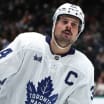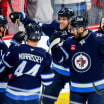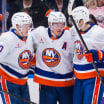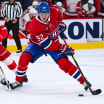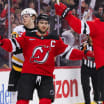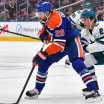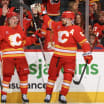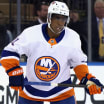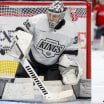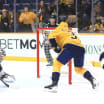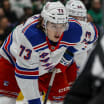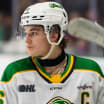Colliton talks Blackhawks rebuild in Q&A
Coach tells NHL.com about expectations for young goalies, defense
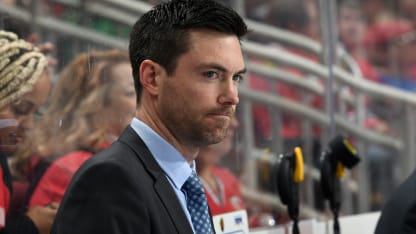
© Norm Hall/Getty Images
"As a coach, it's something you're always thinking about, trying to look to the future and what we may do," the Chicago Blackhawks coach told NHL.com last week. "At the same time, there's a lot of information we're going to take in before we make those decisions. Even just little things like, what kind of camp we're going to have, how much experimenting we'll do and those type of things. But we're definitely starting to throw some ideas around and we'll start meeting as a staff more as we get closer."
The Blackhawks posted a letter to fans on Twitter and on their website on Oct. 20, stating that they are "committed to developing young players and rebuilding our roster." Colliton said the letter and the direction the Blackhawks are taking doesn't change his approach.
"If anything, it just makes it easier to communicate with media and fans regarding decisions we make every day," he said. "As far as how we're going to run the team, it doesn't change that much. Maybe we'll be more aggressive with how we use young guys and opportunities we're giving, but it's not a big change from what our approach has been over the past year, two years. We've played a lot of young players, we've given a lot of opportunity. We're already into the process and I think we've already started to see some of the benefits of it with the development of the guys who did play last year and how they performed in the playoffs."
Colliton discussed the youth movement, defenseman Brent Seabrook, forward Andrew Shaw and more in a Q&A with NHL.com:
With Malcolm Subban and Collin Delia, what have you seen from each or both to believe they'll be the answers in goal this season and beyond?
"We think we have three guys [Subban, Delia and Kevin Lankinen] with a lot of upside. They're kind of at the point where in the American [Hockey] League, they've shown they can play there and be top goaltenders. Can they establish themselves as bona fide, everyday NHLers? Until we give them the opportunity we can guess, but it's hard to know. But we have an open competition, I think all three of them bring a little bit different makeup and we hope all three of them show they can be No. 1 goalies. That would be a great situation for us, but the competition between the three of them, we think, can help boost their performance. Ultimately, we need two of them to come through and show they can play. We're not going to just play one guy, we need two. It's going to be a challenge for them but we're excited. The players want opportunity. It's like, 'just give me a chance.' Perfect. Here it is. Run with it."
With the defense, what do you need to see, what possibilities can you create with offseason moves made?
"Certainly, we got [Nikita] Zadorov coming in, a little bit different dimension, more physical, terrific skater, we think he can add something different to our group. We have some young puck movers who could benefit from having someone more physical, a little more able to get stops in the defensive zone. We do have a bunch of young guys who, we'll see how it looks going forward with how ready they are. But certainly, we're looking to give them opportunity if they show they're ready for it. And we'll see how it all plays out. Obviously, [Seabrook] is coming off his injury, so we'll see how that develops. It's a lot of long rehab for him, and we'll just see how it plays out."
TBL@CHI: Seabrook roofs goal from below goal line
Speaking of Seabrook, is it better for him to play fewer games, fewer minutes, is he more of a mentor than an everyday player now?
"We don't know. We'll map it out here as we get into camp. And obviously a lot depends on the young players as well. Where are they at in their development? Are they ready for more responsibility? It's a big benefit to have a guy like Seabrook around, just his experience and things like that. And he's looking to get in and play. You don't want to handicap it too early."
Have you been in touch with Andrew Shaw on how he's progressing from his concussion this offseason?
"I talked to him in between the bubble and the NHL Draft, just to check in. I mean, he's positive. At the same time, I've got own experience of being through it (concussions). You don't want to nail him down. We're going to see. We all hope he can come back and play. He's very important for us. We love the intangibles that he brings, so much energy and life to the group, so we're all rooting for the best for him."
Kirby Dach, Matthew Highmore and Adam Boqvist got a good glimpse of things last season. How much should that benefit them this season?
"For sure, I think that's part of what we believe is right. Early on in the season, you're identifying young players you think can develop. Of course, they need to be ready for the level, so we think we can give them that ice time and they can handle it. But the player you have in October, when it's a young guy, the transformation between then and, obviously we're talking about a normal season, but March, April, it can really help your team if those guys can get opportunities and run with them. I think that's what happened.
"Boqvist started in Rockford, we felt that was the best thing, then he came up and it was a challenge for him, but he got better as the year went on. I thought in March he was playing really well, with a lot of confidence. Even the guys who faced adversity, to continue with Boqvist, in the playoffs, it wasn't perfect for him and he came out of a game and things like that. But that's all part of it. Going through some adversity because you're not quite ready for it, that's not a bad thing. When they come through it, they will be stronger, they'll be better, they'll be more prepared."
CHI@VGK, Gm2: Dach shovels home rebound in front
How much did Dach learn from the postseason, and what are expectations with him this season?
"We want him to keep getting better, keep improving. There's still a lot there. we can all see the raw material he has as far as the skill and the skating and the size. He did what we hoped he would do last year, as far as early on he's playing 8-10 minutes, some games it was 13, then back to eight. Then come January, February, March, all of a sudden it was pretty consistently 13, 14, 15. In the playoffs, it was 19, 20, and he earned those minutes. He took the opportunity that was given to him and he made it count. We want him to continue that progression, but it may not be perfect. That's the thing that I think is important: We can't be too reactive to the ups and downs. We obviously think he can be an elite player in the League, and we'll do everything we can to help him get there."
It looked like the shoot-first mentality was something Dach lacked at times. Does that come with age, confidence?
"Yeah, he put himself in some fantastic scoring situations and he maybe was a little late to pull the trigger, but he knows that. He knows it in the moment. It's one of those things, you tell him and he's like, 'Yeah, I know.' He's a pretty intelligent player. But the positive for us is a lot of times he beat a guy 1-on-1, or he beat two guys and then he'd end up in a great position and then, yeah, he'd look to pass. He'll figure that out. For me, his production didn't match his play. I think he played better than his numbers would indicate, even in the regular season. So that'll come for him."
This was already a young team, but it's gotten much younger now. What are the differences of coaching more of a veteran team than a very young team?
"Overall, to us, the root to getting back to being an elite team is developing our players, and the area you can get most bang for buck with that development is young guys. The upside is still there, the potential is still there. Everyone can improve through practice and whatever, just working on your game. But we're investing in young guys because we think the payoff is larger. I mean, we've been doing that already, so it isn't a change.
"We're still going to run the team very similarly. But we're trying to give as many guys opportunities as possible because it's not all going to work out. Not everyone of them is going to turn into NHL regulars or turn into NHL difference-makers. But the more we invest in and spend time with and have a plan for them and just work with them daily, the better our chances that they're going to turn into contributors. We're going to have more depth, we're going to have more difference makers, and that's going to allow us to have a better team quicker."


